Home - Plenary Speakers
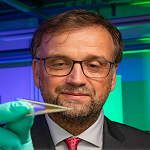
Oliver G. Schmidt is the Scientific Director of the Research Center for Materials, Architectures and Integration of Nanomembranes (MAIN) and holds the Chair of Material Systems for Nanoelectronics at the Chemnitz University of Technology, Germany. He is adjunct Professor of Nanophysics at the Dresden University of Technology, Germany and Honorary Professor at the Fudan University in Shanghai, China. He is an elected member of the German Academy of Science and Engineering and has received several awards: The Otto-Hahn Medal from the Max-Planck-Society in 2000, the Philip-Morris Research Award in 2002 and the Carus-Medal from the German Academy of Natural Scientists Leopoldina in 2005. In 2013 he was awarded the International Dresden Barkhausen Award, in 2018 he received the Gottfried Wilhelm Leibniz-Prize of the German Research Foundation, and in 2019 he was awarded an Advanced Grant of the European Research Council (ERC). His professional activities bridge across several research fields, ranging from small scale robotics and energy storage devices to flexible electronics and biomedical applications.
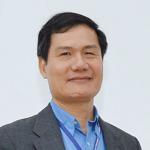
Shaowei Chen finished his undergraduate study in 1991 with a BS degree in Chemistry from the University of Science and Technology of China (USTC), and then went to Cornell University receiving his MS and PhD degrees in 1993 and 1996, respectively. Following a postdoctoral appointment in the University of North Carolina at Chapel Hill, he started his independent career in Southern Illinois University in 1998. In summer 2004, he moved to the University of California at Santa Cruz (UCSC). He is currently a Professor of Chemistry and the Faculty Director of the UCSC COSMOS program. Thus far he has published over 430 peer-reviewed articles and received a number of awards and honors, including the NSF CAREER Award, Cottrell Scholar Award from the Research Corporation for Science Advancement, and Tajima Prize from the International Society of Electrochemistry. He is an associate editor for the Journal of Electronic Materials and Advanced Sensor and Energy Materials, and on the editorial boards of various other journals.
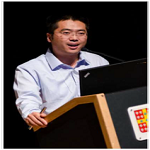
Weiwei Liu received his Ph. D degree from Université Laval, Canada, in 2005, and jointed Nankai University in 2007 as a full professor. His research interest mainly focuses on the ultrafast laser optics, THz science and technology, and applications. He has already published more than 200 scientific papers in peer-reviewed journals with more than 10,000 citation, and H-index reaches 52 (Google Scholar). Prof. Liu has given more than 100 invited talks in international conferences worldwide. Now, he is serving asthe director of Institute of modern optics, member of the standing committee of Chinese Optical Society and vice president of Optical Society of Tianjin,topic editor of Optics Lettes, Optica fellow, etc.
Dr. Wanlin GUO, Academician of Chinese Academy of Sciences, founder and director of the Key Laboratory of Intelligent Nano Materials and Devices of Ministry of Education and the Institute for Frontier Science of Nanjing University of Aeronautics and Astronautics. His current research focuses on hydrovoltaics, intelligent nano materials and devices, novel conception and technology for efficient energy conversion, molecular physical mechanics for neuronal signaling and molecular biomimics, as well as strength and safety of aircraft and engine. He has published more than 500 peer-reviewed journal papers on Nature series, Phys. Rev. Lett., J. Am. Chem. Soc., Adv. Mater., J. Mech. Phys. Solids, Nano Lett., etc. He received the National Science Foundation of China for Distinguished Young Scholars in 1996 and the position of Cheung Kong Scholars in 1999. He obtained the National Nature Science Prize of China in 2012 for his contribution to physics mechanics, the ICCES Eric Reissner Award in 2019 for his sustained contributions to the integrity and durability of aerospace structures, and to nano-mechanics, and the Ho Leung Ho Lee Award for Technological Progress.
Dr. Subrata Roy is an international leader in plasma-based flow control and micro nano scale systems. He is the founding Director of the Applied Physics Research Group at the University of Florida. His key research interests are novel designs of atmospheric plasma actuators for flow mixing and turbulent flow control, numerical modeling of hypersonic flows, space propulsion, and application of plasma reactors for food safety and microbial decontamination. Dr. Roy is the founder and President of SurfPlasma, Inc., that innovates eco-friendly ways to destroy biological and chemical contaminants. Dr. Roy is an inducted Fellow of the National Academy of Inventors, a Distinguished Visiting Fellow of the Royal Academy of Engineering, a Fellow of the Royal Aeronautical Society, a Fellow of the American Society for Mechanical Engineers, and an Associated Fellow of the American Institute of Aeronautics and Astronautics. He serves as a member of the Editorial Board of Nature Scientific Reports and Actuators, and as Associate Editor of Frontiers in Physics, Journal of Fluid Flow, Heat and Mass Transfer, and served as an Academic Editor of PLoS-ONE (2012-2017) and an Associate Editor of the Journal of Fluids Engineering (2005-2007). He has over 200 publications in peer-reviewed journals and bound volumes on plasma flow control research. He is an inventor on 44 United States patent applications of which 28 have been issued.
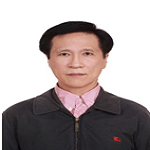
Dr. Huan-Tsung Chang is currently a professor at the Department of Biomedical Sciences, Chung Gung University, Taoyuan, Taiwan. He obtained his Ph.D. from the Department of Chemistry at Iowa State University, Ames, Iowa, USA in 1994. Dr. Chang has broad research interests, including capillary electrophoresis, optical and electrochemical sensors, sustainable energy, green chemistry, nanozymes, and nanodrugs. Dr. Chang has published more than 400 peer-reviewed papers. He was selected as a Fellow of the Royal Society of Chemistry (2013) and Highly Cited Researchers, Clarivate Analytics (2017, 2018). Currently, he serves as the Field Chief Editor, Frontiers in Analytical Science, Executive Associate Editor for Analytical Sciences, and Associate Editor in three journals, including Frontiers in Chemistry, Journal of Food and Drug Analysis, and Biosensors and Bioelectronics. He is an Active Editorial Advisory Board member for Journal of Advanced Research and JACS Au.
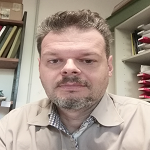
Prof. Fabrizio Chiti, Full Professor, Department of Experimental and Clinical Biomedical Sciences, Section of Biochemistry, University of Florence, Italy Fabrizio Chiti was born in 1971 and graduated in 1995 in Biological Sciences at the University of Florence, Italy, and attained a PhD degree (D.Phil) in Chemistry in 1999 from the University of Oxford. His research, carried out under the supervision of Prof. C.M. Dobson, concerned studies on protein folding. His post-doc work, carried out in the field of protein aggregation and amyloid formation, was carried out at the University of Florence for 2 years and at the University of Cambridge for 1 year. In November 2002 he became Associate Professor of Biochemistry at the University of Florence and is now, starting from December 2010, Full Professor. His scientific interests concern the elucidation of protein aggregation processes, the identification of the molecular determinants of the toxicity of protein aggregates, the study of the effect of chaperones on these processes and the mechanism of cellular toxicity. He has published 186 scientific papers so far, with 21400 citations and an H-index of 66 (Google Scholar) or 57 (Scopus). Publications include ca. 30 papers in Nature, Science, Nature sister journals, Science Advances, PNAS, EMBO J, JACS, PloS Biology, Ann. Rev. Biochem. and other high-profile journals. His awards include election to EMBO Young Investigator program (EMBO), Membership at Academia Europaea, recognition for the Jean-Francois LeFèvre Lecture (École supérieure de biotechnologie Strasbourg) and the Maria Teresa Messori Roncaglia and Eugenio Mari Award (National Academy of Lincei).
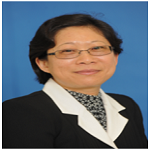
Her profile is at www.odu.edu/~xhxu. Details of presenting author to be mentioned in certificate: Name: Prof. X. Nancy Xu Affiliation: Old Dominion University Country: USA Other Details: Presentation Category: Plenary Speaker Email: xhxu@odu.edu Contact Number: 757-683-5698 Website: www.odu.edu/~xhxu

Professor Nicolas Voelcker is the Director of the Melbourne Centre for Nanofabrication (MCN) and Professor at the Monash Institute of Pharmaceutical Sciences at Monash University. The core research activity in his laboratory is the study of silicon-based nanostructures at biointerfaces. Following from this more fundamental research, his focus is on the application of silicon-based nanostructured materials in biosensors, biochips, drug delivery and regenerative medicine. He has authored over 500 peer-reviewed journal articles with over 22,000 citations, h-index 71, and has filed over 45 patents. He has received fellowships from the German Research Foundation (DFG), the CSIRO and the Alexander von Humboldt Foundation. He has served on the College of Experts of the Australian Research Council, is a Fellow of the Australian Academy of Technology and Engineering, a winner of a Humboldt Research Award and a current Australian Research Council Laureate Fellow. As Director of the MCN, he is overseeing the largest joint venture in the Australian university system, and is supporting over 30 companies in their commercialisation endeavours.